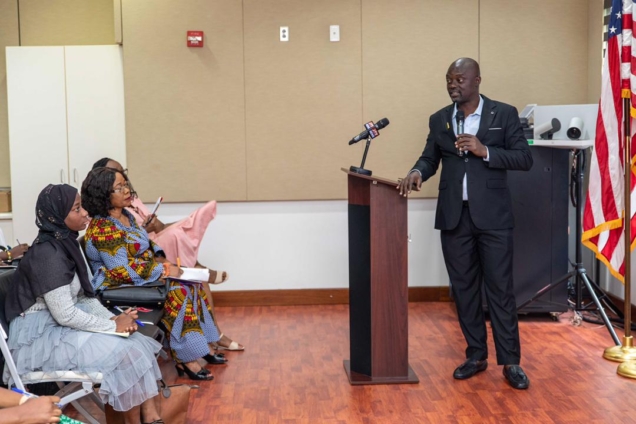Award-winning journalist Erastus Asare Donkor is advocating for a concerted effort to enact policies aimed at curbing illegal mining activities in gold-rich regions of Ghana.
According to him, Ghana must learn from the US, where lands damaged by small-scale mining are quickly fixed to put the land to good use.
In observance of International Earth Day, under the global theme "Planet vs Plastics," Erastus Asare Donkor, renowned for his work on the "Poison for Gold" documentary, delivered a comprehensive analysis on small-scale mining in Ghana and the USA titled "Climate Change, Environmental Regulation, and Mining" at the US Embassy in Accra.
The prevalence of galamsey in Ghana is staggering, with thousands of individuals and communities involved in these activities, especially in gold and mineral-rich areas.
Illegal mining has led to the pollution of over 60% of Ghana's water bodies, resulting in the loss of drinking water sources and farmland for numerous communities.
Delivering his speech, Erastus Asare highlighted the importance of regulating small-scale mining in Ghana, drawing on the experiences of the US. In the presentation at the US Embassy, he proposed policy measures aimed at effectively halting illegal mining in the country.
He called out to all media institutions to come on board and devote more airtime to cover activities pertaining to illegal mining to help curb it.
“If we get more media institutions coming on board — and I’m throwing an invitation to all journalists in Ghana — if we have more media institutions devoting time to this, we will be getting somewhere. After all, the government is just a few people in the Flagstaff House, but the media represents a larger number of people and we have a voice for the people."
"We should be able to put the effects out there and let the people know, empower them, and let them fight from the ground and help save their own space.”
In an interview with JoyNews, Erastus Asare Donkor urged the Ghanaian government to rigorously enforce laws to disassociate the nation from political entanglements related to mining and environmental issues.
“What we should be doing is to be enforcing the very fine laws we have and the will, so that we can distance ourselves politically from mining and environmental issues. The government and the various stakeholders there should be nothing political about this; we should bring all hands on board and make sure that the environment is safe for future generations.”
Latest Stories
-
Man United settle for draw at Ipswich Town in Amorim’s first game in charge
15 mins -
GPL 2024/2025: Prince Owusu screamer earns Medeama win over Young Apsotles
20 mins -
Burning old TVs to survive in Ghana: The toxic trade in e-waste
40 mins -
Perfume boss admitted he ignored Russia sanctions
54 mins -
Wicked proves popular as opening set to be biggest for Broadway film
60 mins -
Nominee for agriculture secretary completes Trump cabinet
1 hour -
ECG urges prepaid customers to top up to last one month ahead of system upgrade
2 hours -
Three more tourists named in Laos methanol deaths
2 hours -
Betway Africa offers a once-in-a-lifetime ‘Play-on-the-Pitch’ experience at Emirates Stadium
2 hours -
The rise and fall of Matt Gaetz in 8 wild days
2 hours -
School Feeding Programme: Bono East NIB seizes smuggled rice, arrest driver
2 hours -
Dr. Razak Opoku: Despite challenges, facts and data still prove NPP is better manager of the economy than NDC
3 hours -
Seidu Agongo: On December 7, it must be peace over power
3 hours -
2024 Election will take place on December 7; ignore misleading claims – EC
3 hours -
GPL 2024/25: Asante Kotoko bounce back with win over Aduana FC
3 hours

